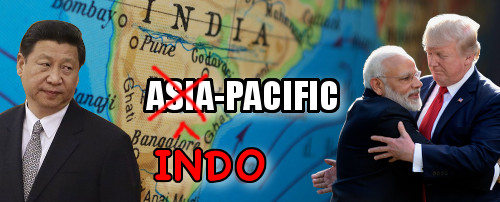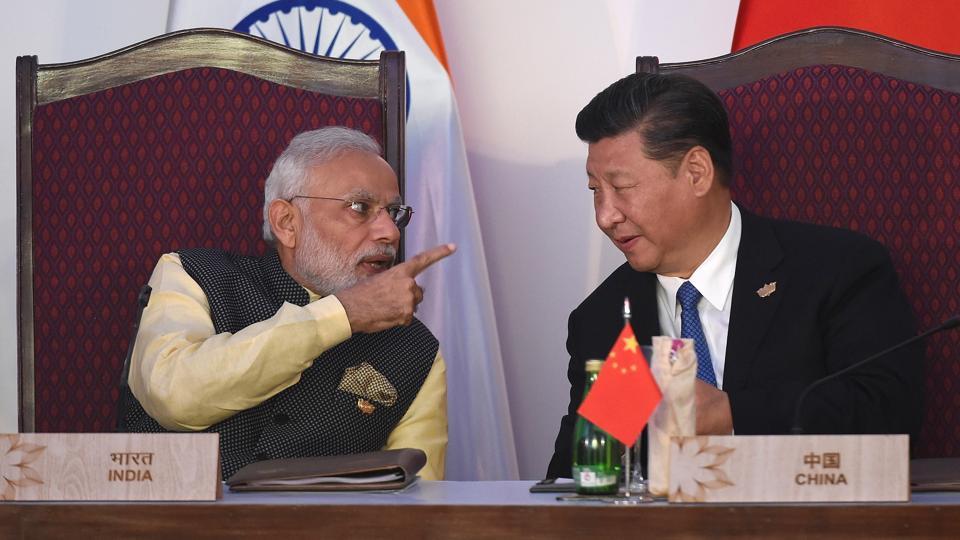Goodbye, Asia-Pacific! Hello, Indo-Pacific?
That’s right, the old “Asia-Pacific” label is so last decade, guys. It’s time to start calling that part of the globe the “Indo-Pacific.” Who cares if it’s geographically nonsensical? America’s military planners and their think tank lackeys are starting to change their nomenclature, and you should too!
The term entered the vernacular last year when Secretary of State Rex Tillerson used it in his “Remarks on ‘Defining Our Relationship With India for the Next Century.'” It was immediately parroted by all the usual propaganda outlets, including the mouthpiece of the globalist establishment, CFR.org.
So why bother? What was wrong with “Asia-Pacific” as a descriptor, and why now the shift to “Indo-Pacific?” When questioned about the change in terminology during Trump’s Asia tour last year, a White House official told India’s Economic Times that the phrase “captures the importance of India’s rise.”
There may be some truth to the narrative of India as a rising power. It has, after all, surpassed China as the fastest-growing economy in the world, and foreign investment figures indicate that boom might not be stopping any time soon. But if you get the sense that Washington’s sudden inclination to rename an entire region to reflect this rising importance is not merely about goodwill for the Indian people, then give yourself a prize. It has everything to do with Washington’s interest in India’s potential use as a pliable vassal state that can be used as a roadblock against the rise of the region’s other great power: China.
Learn more about the mounting tension between Asia’s fastest rising powers (and how Uncle Sam is only too happy to drive the wedge between them) in this week’s Corbett Report Subscriber newsletter.
For full access to the subscriber newsletter, and to support this website, please become a member.
For free access to this editorial, please CLICK HERE.

|
The Corbett Report Subscriber
|
vol 8 issue 09 (March 10, 2018)
|

by James Corbett Goodbye, Asia-Pacific! Hello, Indo-Pacific? That’s right, the old “Asia-Pacific” label is so last decade, guys. It’s time to start calling that part of the globe the “Indo-Pacific.” Who cares if it’s geographically nonsensical? America’s military planners and their think tank lackeys are starting to change their nomenclature, and you should too! The term entered the vernacular last year when Secretary of State Rex Tillerson used it in his “Remarks on ‘Defining Our Relationship With India for the Next Century.'” It was immediately parroted by all the usual propaganda outlets, including the mouthpiece of the globalist establishment, CFR.org. So why bother? What was wrong with “Asia-Pacific” as a descriptor, and why now the shift to “Indo-Pacific?” When questioned about the change in terminology during Trump’s Asia tour last year, a White House official told India’s Economic Times that the phrase “captures the importance of India’s rise.” There may be some truth to the narrative of India as a rising power. It has, after all, surpassed China as the fastest-growing economy in the world, and foreign investment figures indicate that boom might not be stopping any time soon. But if you get the sense that Washington’s sudden inclination to rename an entire region to reflect this rising importance is not merely about goodwill for the Indian people, then give yourself a prize. It has everything to do with Washington’s interest in India’s potential use as a pliable vassal state that can be used as a roadblock against the rise of the region’s other great power: China. But don’t take that from me. Take it from Tillerson:
As I reported in these very pages last year, relations between Beijing and New Delhi cooled when India declined to attend China’s much ballyhooed first Belt and Road Forum for International Cooperation. The forum, held in Beijing last May, brought together 29 foreign heads of state to discuss China’s proposed trillion-dollar “One Belt One Road” project (OBOR) aimed at developing trade routes, infrastructure and development projects throughout the region. Given the incredible amounts of money China has been dispensing in recent years, it isn’t hard to see what excites so many regional leaders about OBOR. The logic is simple: Take Beijing’s infrastructure and development money in return for giving Chinese companies and products a foot in the door of domestic markets. Who wouldn’t take such a deal? India, that’s who. They ended up skipping the party in Beijing over well-publicized concerns about the China-Pakistan Economic Corridor (CPEC), a proposed $60-billion-plus infrastructure project to develop parts of Pakistan’s border area that are disputed by arch-rival India. India’s concern was that China was trying to use its financial clout to force a resolution to those disputes, and guess who sided with New Delhi on the issue? Extra points if you guessed Mad Dog Mattis and his cohorts at the White House. And as I also reported last year, China and India came surprisingly close to military confrontation last summer over a seemingly insignificant mountain pass in a disputed area between China and Bhutan. In short, Bhutan objected to China’s attempt to extend a road in the area, and India, taking Bhutan’s side, actually sent troops into the region to prevent the construction. This led to back-and-forth allegations of “breaches of national sovereignty” and to a nearly two month-long standoff between China and India. Eventually the two sides agreed to a speedy disengagement from the area, although China refused to rule out its continuation of the road construction in the future. But if all that weren’t enough, along comes a crisis in the Maldives to once again put Beijing and New Delhi on opposite sides of a geopolitical dispute. The story of the Maldives’ constitutional crisis is beyond the scope of this editorial, fascinating as it may be, but the long story short is that the Maldives—a chain of islands southwest of Sri Lanka in the Indian Ocean—is in a declared state of emergency after the current president, Abdulla Yameen, refused to abide by a Supreme Court decision to release nine political opposition members from jail. The Maldives has traditionally been considered squarely within India’s sphere of influence, but Yameen has been friendlier with China and, not incidentally, the easy OBOR money that Beijing is sloshing around these days. Once again, China and India are squaring off against each other. The political opposition in the Maldives has called on India to intervene militarily to restore order in the country, which at any other time in history India would have gladly done. But this is not any other time in history. This time China made its presence known by sending eleven warships into the East Indian Ocean just as India was debating whether or not to act. The bold move seems to have worked. India has, thus far, stayed out of the situation. But Indian fears about growing Chinese presence in the region, from Gwadar to Djibouti, are becoming outright panic, if the always-interesting Indian TV panel shows are any indication. (Seriously, could you imagine an American television show convening a commercial-free, one-hour, high-level geopolitical discussion that was free of sensationalism and didn’t talk down to its audience?) Worryingly, this sense of panic seems to be setting in at the highest echelons of the Indian military. In a severe breach of diplomatic protocol that again could lead to military tension, the chief of the Indian army this week accused China and Pakistan of facilitating an influx of insurgents into India’s northeast from Bangladesh. In short, the relationship between Beijing and New Delhi is not all rainbows and lollipops these days. Having said that, there are hopeful signs that the India-China tensions are not spiraling out of control…yet. As I reported last year, India is now a full-fledged member of Beijing’s Shanghai Cooperation Organization, sometimes touted as a counter-NATO. Given that the two countries are now bound in a joint economic-security pact that holds coordinated military exercises, the prospect of their burgeoning rivalry spilling over into hot war seems that much less likely. And Beijing continues to extend the fig leaf to New Delhi over the CPEC dispute, so the two sides are not done talking yet. But still, the writing is on the wall: The neocons in charge of the American war machine have chosen India to be their next best hope for a potential roadblock to Chinese dominance in Asia, and they’re re-naming the entire region just to prove it. It is undoubtedly the case that any and every dispute between India and China is being exacerbated by Uncle Sam whispering in Indian Prime Minister Modi’s ear that India is the true continental super power. And like every other instance of imperial meddling during the age of Pax Americana, it is a cynical lie. Or, at least, it doesn’t matter to Washington whether India really does become a continental super power, just as long as the latter acts as a thorn in China’s side. It remains to be seen whether the other regional powers (such as Australia and Japan) will climb on board this “Indo-Pacific” idea, but watch for “Indo-Pacific” to become the new hot buzzword in American geopolitical discussions in the coming years. Heck, it’s already catching on in Canada. All I know is I’m not going to be retroactively editing the title of the Asia-Pacific Perspective! |
Recommended Reading and Viewing
Recommended ReadingChina to Scrap Term Limits for President – Japan Times Recommended ListeningJodie Evans on CodePink’s “Divest From The War Machine” Recommended ViewingDTUBE ONLY VIDEO – Parkland Code Red Documentary Just For Fun |
[supsystic-price-table id=59]










So it took precisely 0 seconds after tweeting this newsletter to find a relevant update:
https://twitter.com/corbettreport/status/972482098958225408
I must take time to compose myself after reading Tillerson’s speech. The and hypocrisy of this history ignoring
lier make one feel like vomiting. Sorry.
I agree. Every time I hear the Trump regime make accusations about other nations I feel my stomach churn. Just listen to Trump’s speeches on Iran and how its the “greatest destabilizing power” of the Middle East. It would be laughable if it were not so disgustingly hypocritical. All while he’s shaking hands with Saudi Arabia and Israel, the true Middle Eastern terrorists…
Makes me think of that old adage “when you point your finger at someone three fingers point back at you.”